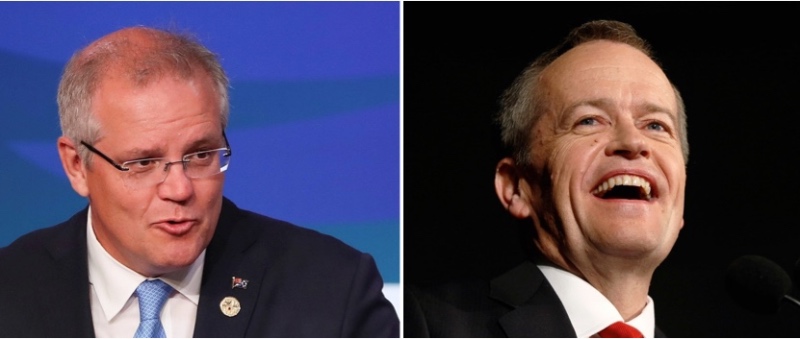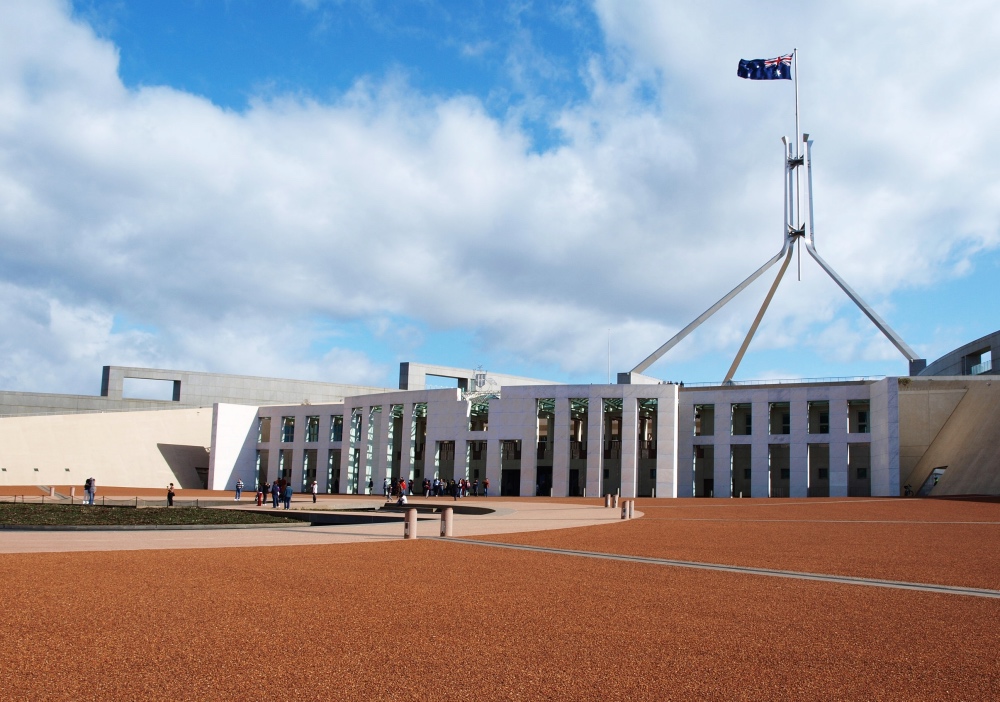
CHRISTOPHER GILBERT reports on what issues Christians are highlighting in the lead-up to Australia’s federal election on 18th May…
Sydney, Australia
Disinterest and disengagement. Those reading the political commentary on the Australian federal election of 2019 will know it’s hard for the pundits to predict a result this time with a population infected by these two “d” words.
Yet, as the words “federal election” incite a yawn for many, the largest Australian Christian denominations are communicating to their constituencies vision and purpose – and, with them, many reasons to engage. And the message is clear: that they’re looking for congregations to vote for the good of the many rather than just themselves and those in their circles.

Australian Prime Minister Scott Morrison (left) and Australian Labor Party leader Leader Bill Shorten face off in the federal election on 18th May. PICTURES: Left – Fazry Ismail/Pool via REUTERS (taken on 17th November, 2018); and, right – REUTERS/Jason Reed (taken on 2nd July, 2016).
From a Catholic bishops’ statement to a commentary from the Anglican Archbishop of Sydney and the vision statement of the Uniting Church in Australia, the engaged voter can find many important community-wide concerns that need addressing by the next parliament. The churches want their people to engage and choose representatives carefully.
“I think there is a bit of disinterest around it [the election] but it comes from political parties not casting a vision of hope and a sense of direction and purpose for our country, which I think there is a real appetite for,” says Rob Floyd, associate general secretary of the Uniting Church in Australia Assembly.
“I think there is a bit of disinterest around it [the election] but it comes from political parties not casting a vision of hope and a sense of direction and purpose for our country, which I think there is a real appetite for.”
– Rob Floyd, associate general secretary of the Uniting Church in Australia Assembly.
“I think particularly in regard to climate change, the young people of Australia are repeatedly speaking out about both their hopes and their demands of government to take seriously this important issue.”
Issues like the desire of Indigenous peoples for a treaty, the need for greater action on climate and the environment, a more compassionate response to refugees and asylum seekers, an economy that distributes its rewards more equitably, a welfare system that is responsive rather than dismissive of the most needy in the community, freedom of religion and belief, freedom of choice in education and the shrinking Medicare subsidy are all listed by Christian churches as being among their top priorities.
Meanwhile, faith-based groups like the Australian Christian Lobby highlight issues like abortion and euthanasia, religious freedom in schools and keeping the Lord’s Prayer in parliament. Micah Australia, meanwhile, promotes concern for greater Australian generosity in domestic and foreign aid and leadership as a global citizen.
There appears a distinct contrast between the over-arching societal concerns of the churches and the pragmatic concerns of the political parties which have tailored tax policies to appeal more to economic self-interest along with social policies designed to satisfy sectional concerns. But how does this translate to the grass roots?
Perth pastor Rory Shiner told Reuters recently that his congregation appeared most concerned about Australia’s treatment of refugees, and retaining a legal right to speak freely about their faith. Laws on abortion, which is legal on request in most Australian states and partly funded by the country’s universal healthcare system, had also been raised, he said.
“I was speaking to someone who said he was leaning 60 per cent one way and 40 per cent the other but he had to give 100 per cent of his vote to someone,” said Shiner, who leads an independent evangelical church.

Australia’s Parliament House. Churches are urging Christians to make their vote count. PICTURE: Michael Dawes (licensed under CC BY-NC 2.0)
One Sydney-based Christian, who wished to remain anonymous, tells Sight that it was “unfortunate” that to older people who have been born Australia, supporting a political party appeared to be “like a religion”.
“So they don’t appear to vote with any commitment to an outcome that serves people different to themselves,” he says.
As an Angolan by birth, he has lived in Australia for 25 years, through both Labor and Liberal governments. Like many African immigrants to Australia, he is disheartened by the current community attitude toward immigration.
“The immigrant life is a lonely one for the first many years,” he says. “It’s one of the reasons we gather in churches and community groups in order to support each other and kill that loneliness, which can only be cured when one gets a visitor from the home country. But it hurts when a government doesn’t understand how important it is to have our families visit us.”
He says it’s hard for him to know who to vote for.
“The immigrant life is a lonely one for the first many years. It’s one of the reasons we gather in churches and community groups in order to support each other and kill that loneliness, which can only be cured when one gets a visitor from the home country. But it hurts when a government doesn’t understand how important it is to have our families visit us.”
– An anonymous Christian immigrant who lives in Sydney.
Catholic bishops address his concern in their document as does the Uniting Church in its vision statement.
“Very high in our thinking is how we, as a diverse nation in terms of culture, language, faith, ethnicity and lived experience, build a welcoming and compassionate nation,” says Floyd, of the Uniting Church.
“Our sense is in the last few decades Australia has seemed to become less welcoming, less compassionate. We believe Christ is calling us to be more welcoming and more compassionate. We believe that is fundamentally the nature of Australians – to be good neighbours to one other.”
RELATED: ESSAY: WHEN AUSTRALIA GOES TO THE POLLS, VOTE FOR SOMEONE ELSE
Some Christian agencies operate in policy niches like the Salvation Army, which is clearly identified along with the Catholic Church and the Uniting Church, as a major player in the welfare sector. Its election website page vies with Micah Australia’s election response as most easily understood, practical in outcome, and interactive for those who engage with it. And its main concerns are familiar to many Australians: government action on poverty, homelessness and housing, employment, family violence, alcohol and drug abuse.
Rob Floyd, meanwhile, could be speaking for most of the major Christian institutions when he notes that the Uniting Church is “trying to encourage people to be engaged, to be thoughtful, to look at broader issues beyond our own needs and wants that are often where politics plays to”.
“We wanted to cast a vision of the Australia we are hoping for, a vision of the sort of Australia that we believe Christ is calling us to. And the purpose, then, is to be able to say these are the highest ideals, these are our visions, and we can talk to governments over the next parliament – how are we going in this, how are we going in being the best we can be as a nation?”





